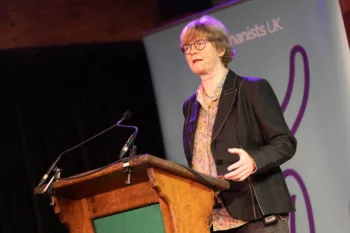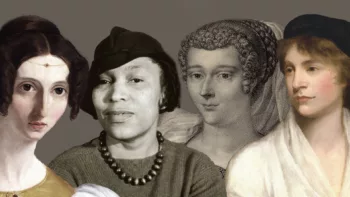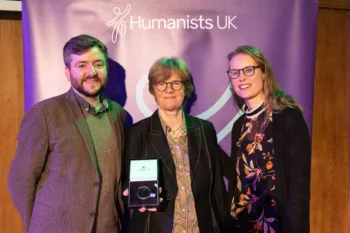
Last night, Sarah Bakewell delivered the prestigious Humanists UK Rosalind Franklin Lecture at Conway Hall, a home of humanism in London, with her talk Humanly Possible on the subject of her upcoming book of the same name.
The lecture was an inspiring look back through 700 years of history, plucking out the stories of seven women – some well-known, others less so – who against the prevailing norms of their time chose to think for themselves, and act for everyone. The lecture took place in-person and online, with an audience of over 500 people.
Humanists UK’s Rosalind Franklin Lecture is the centrepiece of Humanists UK’s International Women’s Day celebrations. Each year, the lecture is held in the same week as International Women’s Day, to explore and celebrate the many contributions of women to society, and towards the promotion and advancement of humanism in the UK.
Sarah’s talk could not have been more appropriate for the Rosalind Franklin Lecture. Over the course of 60 minutes, Sarah told the stories of seven radical, humanist women who lived and changed their societies over the last 700 years, namely:

Christine de Pizan, author of the Book of the City of Ladies; Marie de Gournay, author of Apology for the Woman Writing and other feminist works; 18th century revolutionary and feminist Mary Wollstonecraft, best known for A Vindication of the Rights of Woman; Harriet Taylor Mill, the 19th century liberal and feminist, co-creator with John Stuart Mill of works including The Subjection of Women; 19th century novelist and poet George Eliot; Jane Ellen Harrison, author of Heresy and Humanity and Homo Sum; and Zora Neale Hurston, the 20th century American writer and folklorist, of humanist and Epicurean views.

In her Rosalind Franklin Lecture, Sarah drew on the research she has undertaken – much of it in Conway Hall’s own library – for her upcoming book Humanly Possible: 700 Years of Humanist Freethinking, Enquiry, and Hope. Signed advance copies were available for sale for the very first time at last night’s lecture. The book, published by Penguin, goes on general sale on 30 March.
Following the lecture and a rapid question-and-answer session taking in questions from the hall and online, Niki Seth-Smith presented Sarah Bakewell with Humanists UK’s Rosalind Franklin Medal for her work in researching and exploring humanism and humanist thought through the ages, and breathing life into the stories of those individual, radical humanists, writers, scientists, and thinkers, women and men.
Humanists UK Chief Executive Andrew Copson said:
‘I was delighted to see Sarah accept the Rosalind Franklin Medal tonight. At Humanists UK, we have long fought for wider recognition for the profound impact that humanists and humanist thinking have had on the world around us – shaping and improving the institutions, norms, and values of our society, including with our Humanist Heritage project.
‘In last night’s Rosalind Franklin Lecture, Sarah took us all back 700 years, and right through to the present, weaving together the stories of seven radical humanist women who, through their writing, challenged the prevailing norms and chose to think for themselves and act for everyone.’
The Rosalind Franklin Lecture was recorded and will be available to watch on the Humanists UK YouTube channel soon.
Notes
About Sarah Bakewell
Sarah Bakewell had a wandering childhood, growing up on the ‘hippie trail’ through Asia and in Australia. She studied philosophy at the University of Essex and worked for many years as a curator of early printed books at the Wellcome Library, London, before becoming a full-time writer. Her books include How to Live: A Life of Montaigne, which won the Duff Cooper Prize and the National Book Critics Circle Award, and At the Existentialist Café, one of The New York Times’ Ten Best Books of 2016. Bakewell was also among the winners of the 2018 Windham-Campbell Literature Prize. She still has a tendency to wander but is mostly to be found either in London or in Italy with her wife and their family of dogs and chickens.
About Niki Seth-Smith
Niki Seth-Smith is a writer and journalist, and is the Editor of New Humanist magazine.
About the Rosalind Franklin Lecture series
Marking International Women’s Day, this explores and celebrates the contribution of women towards the promotion and advancement of aspects of humanism in the UK and around the world. The Rosalind Franklin medallist has made a significant contribution in one of these fields.
The lecture and medal are named for Rosalind Franklin, humanist and scientist, whose contribution to science for many years went unacknowledged on account of her sex but who is today rightly celebrated.
About Humanists UK
Humanists UK is the national charity working on behalf of non-religious people. Powered by 100,000 members and supporters, we advance free thinking and promote humanism to create a tolerant society where rational thinking and kindness prevail. We provide ceremonies, pastoral care, education, and support services benefitting over a million people every year and our campaigns advance humanist thinking on ethical issues, human rights, and equal treatment for all.
